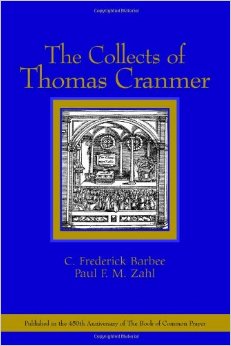
Looking through our archives the other day, I was surprised to discover that we’ve never posted an excerpt from The Collects of Thomas Cranmer by Paul Zahl and Fred Barbee. It’s a wonderful little book, really more of a devotional, and not just for those who are interested in Cranmer’s prayers or the Anglican tradition. Take for instance the meditation on the collect for the Second Sunday in Lent (this past Sunday):
The Collect: Almighty God, which doest see that we have no power of ourselves to help ourselves; keep thou us both outwardly in our bodies, and inwardly in our souls; that we may be defended from all adversities which may happen to the body, and from all evil thoughts which may assaut and hurt the soul; through Jesus Christ our Lord.
 Meditation: The progression of the thought here is, like so many of the Collects, both devastating to the human being on his own terms, and at the same time hopeful.
Meditation: The progression of the thought here is, like so many of the Collects, both devastating to the human being on his own terms, and at the same time hopeful.
First, we admit to God the plain fact that “we have no power of ourselves to help ourselves.” Is this plain? Is it obvious? Or is it a fact subject to dispute? Step One of the Twelve Steps concurs. World history concurs–at least if you reckon that wars and holocausts in the twentieth century took more lives than every single conflict in the nineteen centuries preceding. Your personal history probably concurs, at least if you have ever been mired in a hole so deep that left to the devices and desires of your own heart you could only sink further into it. The Collect hinges on our earnest if reluctant agreement with the first point.
Second, we are asking God, who exists outside of us, to keep us. Why speak to Him if He exists within us? Why differentiate an “I” from a “Thou” if He is not external to us, extra nos? We petition God to keep us safe externally (Psalm 91) and also safe within ourselves (Pslam 32). Hold us, grasp us, claim us, do not let us slip through Your fingers like an eely tadpole or like the grains of sand.
Third, such keeping, or safekeeping, should result in the best defense. Again, the request is dual: defend us from all outward assault and defend us from all inward temptation. More emphasis–more words in the phrase–is placed on the “evil thoughts” than on the bodily adversaries. This is typical of the Prayer Book’s worldview. The inner life is more important than the outward experience because it is more lasting. You can be a shell of yourself and still be noble and beloved. You can be a spectacular physique, a true specimen, and be contemptible and alone.
The Collect devastates the human control factor and set limitless hope upon the sure hold of God.
https://www.youtube.com/watch?v=xfPnIdzcG7c

COMMENTS
Leave a Reply












